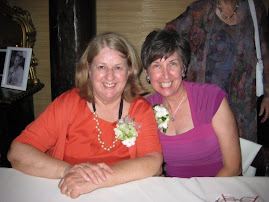
I don’t generally talk about the financial aspects of retirement in this blog because I don't have the expertise to deal with all the complexities of finance. All I can do is to share my own experiences as I prepared for retirement. I knew that it was not safe to leave anything to chance or to make unsubstantiated assumptions about my status when it came to comparing income with expenses. I did my homework and analyzed my finances to see how much money I would need to live on a monthly basis. If you haven’t done that yet, I advise you do it before making decisions about your retirement. It might seem a very un-sexy way to spend a weekend, but it will pay off dividends in the long run.
I remember sitting at my dining room table with all of my records of expenses from the past year spread out around me. (I save all bills, for one year, to be referred to for tax purposes when IRS time rolls around.) It was an interesting exercise to see where all my money was going and then to predict how those expenses would change when I retired. Would I still need to spend as much money on clothing? (The answer is no, by the way.) After my first year of retirement, I went back and did a new analysis of spending and found that the areas where I am spending less are clothing, gasoline, and eating-out. The one area where I am spending more is electricity. I suppose that is because I am home all day now and am therefore, logically, consuming more energy, such as using the computer to write this blog.
If you haven’t already done so, take an inventory of all your assets: bonds, certificates of deposit, property, mutual funds, IRA’s . Visit with the appropriate personnel where you work to know exactly what your retirement benefits will look like: pension, health insurance, life insurance, etc. Take those annual social security statements very seriously and read them so you understand every word contained in them. How big is the difference in amount of your benefits if you take them at age 62, 66, or 70? And finally, analyze your debts to see how much you can pay off while you are still working and your income level is higher. Ask a financial advisor to be a second pair of eyes for you as you do this research. Read a book by a respected financial expert (Ric Edelman, Suze Orman, et al.).
A major question to consider is to ask yourself what your long-term goals for retirement are. Do you have plans for travel or other projects? Do you think you will be spending time volunteering? Would you be interested in taking on a part-time job? Do you have expensive hobbies? What about the issue of your estate planning? Is it important to you that you have money to leave to your children? Do you have long term care insurance? What provisions have you made for yourself if you need nursing home care? Have you talked to your children or other family members about wills and powers of attorney?
As I said, talking about finances is not “sexy” but it is unavoidable. So far, I am managing to live in the manner to which I became accustomed for the 34 years that I worked as a school teacher or supervisor in public education. Some of you may be saying somewhat sarcastically right now “Well, that’s not anything to brag about, what with the reputation of salaries in public education.” If so, you would be right and wrong. While I may not have had an income that allowed for excessive spending and buying everything I thought I wanted, I had a more than adequate income for my needs. I had a rich professional life; I always had excellent health insurance; I am guaranteed a life long pension. Teaching and working in public education do have their benefits—some which I did not fully appreciate until I retired.
It is impossible to discuss financial planning without touching on one very important aspect of financial maturity, i.e., learning to distinguish the difference between needs and wants. I recommend for your reading a book by Michelle Singletary, business columnist for the Washington Post, The Power to Prosper: 21 Days to Financial Freedom. I tried a 21-day financial fast as recommended in her book. It’s amazing how much less money you spend when you go shopping only when you really need something. For the first time in a year, my credit card bills were low enough that I could fully pay off all bills I had incurred in one month. Try it and see for yourself.
I remember sitting at my dining room table with all of my records of expenses from the past year spread out around me. (I save all bills, for one year, to be referred to for tax purposes when IRS time rolls around.) It was an interesting exercise to see where all my money was going and then to predict how those expenses would change when I retired. Would I still need to spend as much money on clothing? (The answer is no, by the way.) After my first year of retirement, I went back and did a new analysis of spending and found that the areas where I am spending less are clothing, gasoline, and eating-out. The one area where I am spending more is electricity. I suppose that is because I am home all day now and am therefore, logically, consuming more energy, such as using the computer to write this blog.
If you haven’t already done so, take an inventory of all your assets: bonds, certificates of deposit, property, mutual funds, IRA’s . Visit with the appropriate personnel where you work to know exactly what your retirement benefits will look like: pension, health insurance, life insurance, etc. Take those annual social security statements very seriously and read them so you understand every word contained in them. How big is the difference in amount of your benefits if you take them at age 62, 66, or 70? And finally, analyze your debts to see how much you can pay off while you are still working and your income level is higher. Ask a financial advisor to be a second pair of eyes for you as you do this research. Read a book by a respected financial expert (Ric Edelman, Suze Orman, et al.).
A major question to consider is to ask yourself what your long-term goals for retirement are. Do you have plans for travel or other projects? Do you think you will be spending time volunteering? Would you be interested in taking on a part-time job? Do you have expensive hobbies? What about the issue of your estate planning? Is it important to you that you have money to leave to your children? Do you have long term care insurance? What provisions have you made for yourself if you need nursing home care? Have you talked to your children or other family members about wills and powers of attorney?
As I said, talking about finances is not “sexy” but it is unavoidable. So far, I am managing to live in the manner to which I became accustomed for the 34 years that I worked as a school teacher or supervisor in public education. Some of you may be saying somewhat sarcastically right now “Well, that’s not anything to brag about, what with the reputation of salaries in public education.” If so, you would be right and wrong. While I may not have had an income that allowed for excessive spending and buying everything I thought I wanted, I had a more than adequate income for my needs. I had a rich professional life; I always had excellent health insurance; I am guaranteed a life long pension. Teaching and working in public education do have their benefits—some which I did not fully appreciate until I retired.
It is impossible to discuss financial planning without touching on one very important aspect of financial maturity, i.e., learning to distinguish the difference between needs and wants. I recommend for your reading a book by Michelle Singletary, business columnist for the Washington Post, The Power to Prosper: 21 Days to Financial Freedom. I tried a 21-day financial fast as recommended in her book. It’s amazing how much less money you spend when you go shopping only when you really need something. For the first time in a year, my credit card bills were low enough that I could fully pay off all bills I had incurred in one month. Try it and see for yourself.






